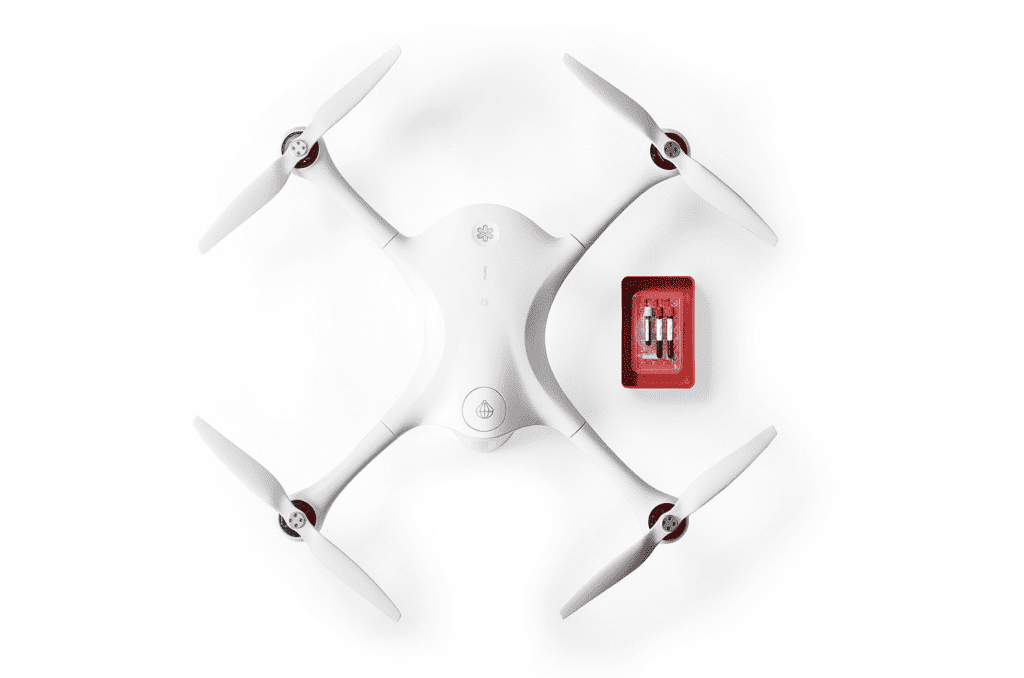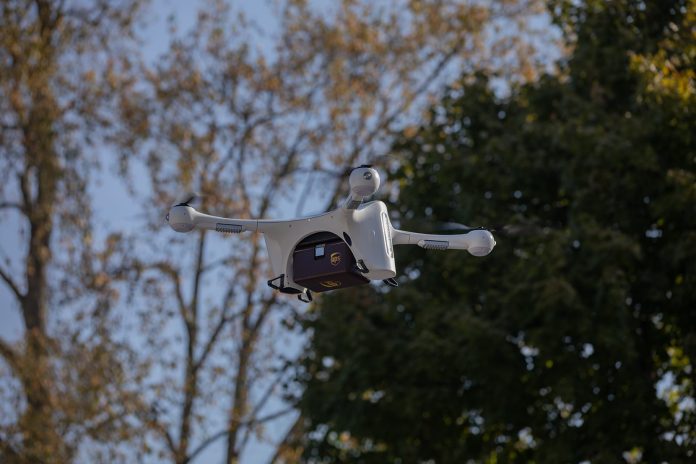Package delivery company UPS has received approval from the Federal Aviation Administration (FAA) to operate a fleet of aerial delivery drones. The certification puts no limits on the size or scope of operations, and enables drones to operate ‘beyond visual line of sight’ (BVLOS). It also permits the drone and cargo to exceed 55 pounds and fly at night.
UPS has immediately put drones into action, for medical deliveries to WakeMed’s hospital campus in Raleigh, in North Carolina, where it has been running a restricted drone delivery service since the middle of the year.
The company’s subsidiary UPS Flight Forward is the first to be awarded the full FAA certification, known as a Part 135 Standard certification, allowing for holders to operate a “drone airline”. It is making deliveriers to the WakeMed campus using a Matternet M2 quadcopter. These are the first “revenue-generating delivery” to be approved for BVOS operation in bthe US.
UPS called its “history making”, and said it will expand its drone delivery service to support hospital campuses around the US. Hospitals rely on short transit times for supplies, which last-mile drone deliveries deliver, it noted. UPS said it will expand the service beyond the healthcare industry, too.
David Abney, chief executive at UPS, said: “This is history in the making, and we aren’t done yet. Our technology is opening doors for UPS and solving problems in unique ways for our customers. We will soon announce other steps to build out our infrastructure, expand services for healthcare customers and put drones to new uses in the future.”
Elaine Chao, US secretary for transportation, said: “This is a big step forward in safely integrating unmanned aircraft systems into our airspace, expanding access to healthcare in North Carolina and building on the success of the national UAS Integration Pilot Program to maintain American leadership in unmanned aviation.”

UPS said the Part 135 Standard certification enables it to scale its operations to meet demand, including rapid build-out of ground-based, detect-and-avoid (DAA) technologies to verify drone safety, while enabling future service expansion. The company will also construct a centralised operations control center, and seek partnerships with additional drone manufacturers for new drones with varying cargo capacities.
Reacting to the news, data and analytics company GlobalData said the new certification “heralds a new era of parcel logistics”. Mike Vousden, automotive analyst at GlobalData, said: “It is a clear indicator of how UPS will provide coverage on critical ‘last mile’ of parcel delivery – the distance between the delivery van or local hub, and the front door of the intended recipient.”
GlobalData expects global revenue generated by drones in the civilian segment to leap from $5 billion in 2018 to more than $20 billion in 2028 (see below), driven by drone delivery services, as well as consumer-operated drones for private pursuits such as photography and remote-control racing.

Vousden said: “The drone fleet is launching when UPS is exploring a range of options to make deliveries more efficient. Most prominent is the deal UPS signed with US electric vehicle maker Workhorse in February 2018 to purchase 1,000 electric delivery trucks designed collaboratively between the two companies. For its part, Workhorse has also been developing its Horsefly autonomous drone delivery system that’s physically built into the roofs of delivery trucks – making it an ideal complementary technology to UPS’ drone fleet.
“UPS will be keenly aware of Amazon’s commitment in September to purchase 100,000 electric vans from electric vehicle startup Rivian. This move to modernising its delivery network – in particular, last-mile deliveries – comes as a response to the rapidly changing face of logistics, as consumers increasingly choose e-commerce and home deliveries, over traditional shopping experiences.”
UPS has also been using autonomous trucks to haul cargo between Phoenix and Tucson in Arizona, since May. San Diego-based startup TuSimple, its collaborator on the project, claims a 30 per cent reduction in transportation costs. UPS’s venture arm has taken a minority stake in TuSimple.
According to UPS, the goal is to understand how to implement Level 4 autonomous driving.

